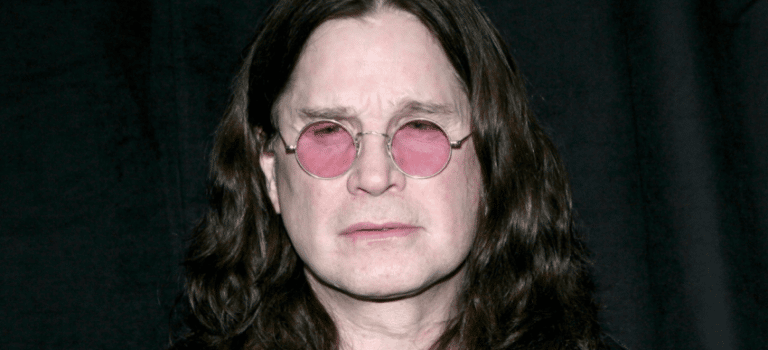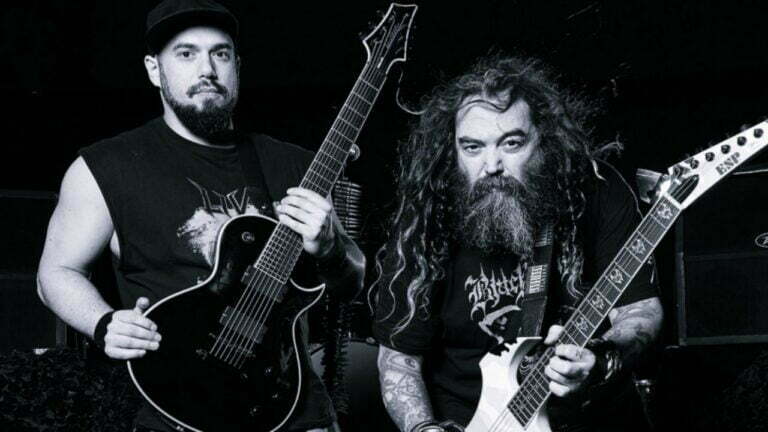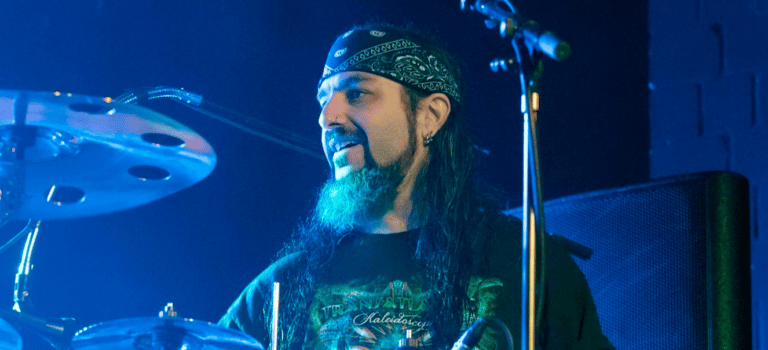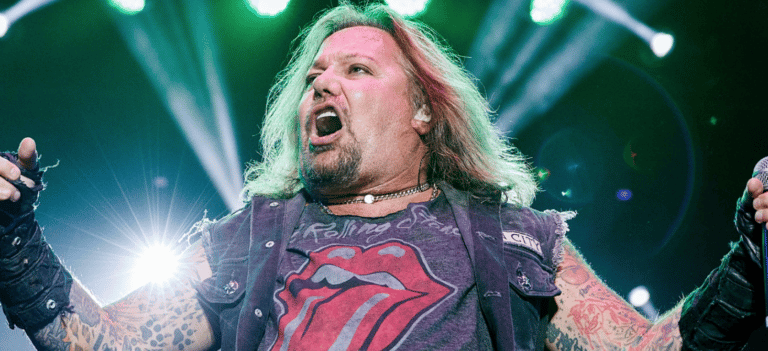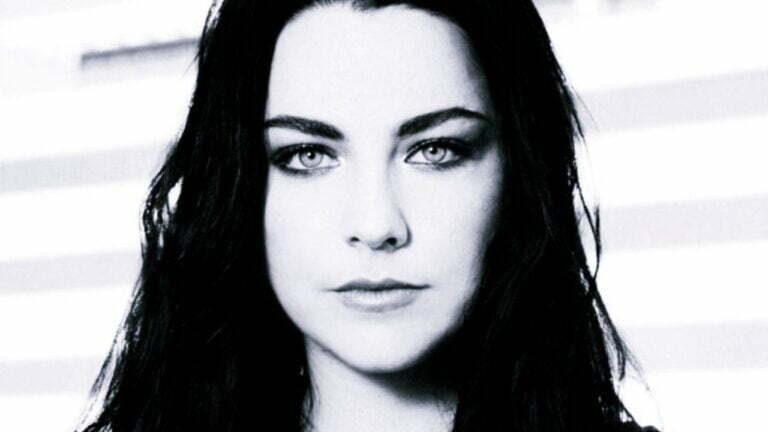An Interview with Frank Bello of Anthrax: “We Are Working on New Music”
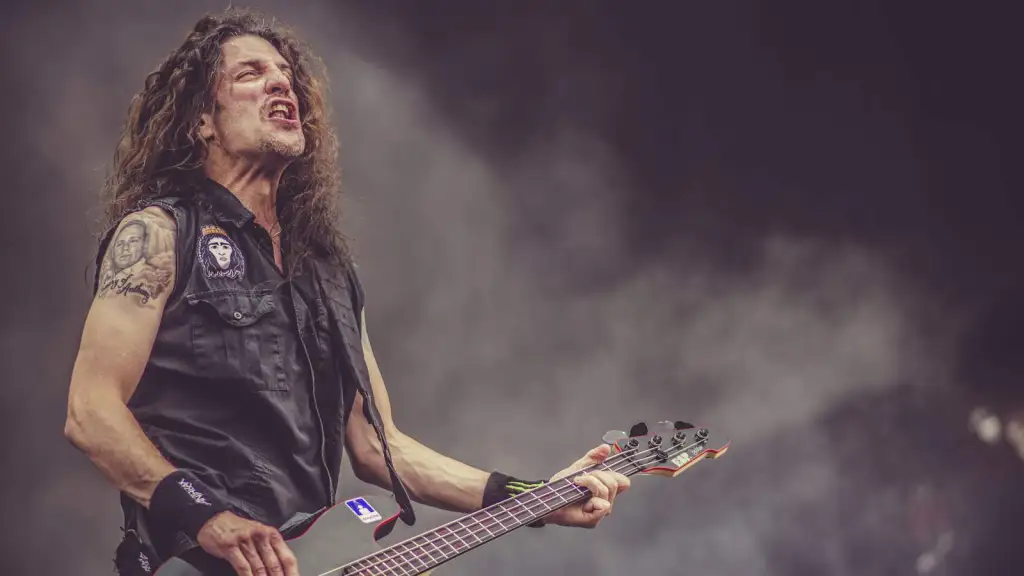
All images courtesy of HER-Fitz PR
As a member of the “The Big Four,” Frank Bello has been corrupting young minds for nearly four decades.
He’s been a bassist, an artist, and now an author. Bello’s early life as a roadie for Anthrax and his eventual comeuppance as Anthrax’s long-running bassist is the stuff of legend. In his book, Bello tells an encouraging story of hope and positivity in a world which always seems to be shrouded in doom and gloom.
While promoting his book, Frank touched on his solo work, working with Page Hamilton, his influences, some stories from on the road, and the future of Anthrax. All of which you can read about in his book Fathers, Brothers, and Sons: Surviving Anguish, Abandonment, and Anthrax, which came out November 2nd, 2021.
Andrew: You look tired, Frank. How have you been?
Frank: I don’t know; I’m just looking at how I look. Is this the hangover? Is that a hangover? It might be… that’s a hangover look. I’m gonna say it’s a hangover look. That’s fine. A bit of vodka in my diet last night. It was alright, though. It was a Thursday night, a party night. So, I apologize for the appearance, man. Thanks for having me, man, fun to talk to people after all this wonderful stuff that’s been going on.
Andrew: What first sparked your interest in music?
Frank: Well, just growing up and looking for stuff, after a lot of therapy, this is how you come to know all this stuff because it brings it out in you. Why I went to music because music made me feel better about all the negativity that happened from the abandonment. The therapists will tell you, “Oh, this is why you went to the music, it made you feel better, and you connected with the music because it was an outlet.” That’s what they do, the therapists, and many therapists I’ve had. And you say, look, “I’m very thankful for music ’cause it was that outlet and when I learned how to play an instrument, and I’m still learning.”
I’m still a student of music. And I never wanna stop being a student. I think you learn something every day. I think it’s really important to just keep that hunger and keep that outlet open. You’re starting guitar. Dude, I love hearing that for new players ’cause you’re giving yourself a chance to have an outlet. If I have a bad day, if I have a shit day, I’ll come home and pick up a guitar, or bass, or piano upstairs, I’ll just get out of that mood and just play a couple of chords and play the song. Whatever it is, man, get me out of that zone, and all of a sudden, you start thinking, “Alright, things are a little bit better right now.” And that’s what matters. That’s the outlet of music for me. That’s why it works for me.
Andrew: Were you self-taught, or did you take lessons?
Frank: Yeah. You know, Anthony, I started playing myself, but I wanted to learn a proper way. In the Bronx, I went to two or three lessons, and I went to this store near my house, a local music store, and I felt like I knew songs because I learned by ear and I knew songs. They were teaching me the stuff I knew, and I kind of felt like they were taking advantage, to be honest, and they were saying they wanted to teach me certain easy stuff that I know like, A… I do this in my clinics, and they teach me like they would teach me A, A, A, B, B, B, C, C, C. And that would be the lesson. And $35, I say, “This is a $35 lesson.”
In those days, it was very expensive for me. It’s still money. I was making $2 an hour at my uncle Joe’s Deli. So, $35 was a chunk of my dough, so it had to make sense. And when I felt like I wasn’t progressing the way I wanted to, ’cause I was playing Beatles songs and Rush songs. They would say, “No, we have to start here on A, A, A, B, B… “ I said, “No, I know that. I wanna go on to the next stage.” And I kind of felt like they were taking advantage and kinda draining me for dough.
So, I just pulled out of that, I said, “Look, I’m gonna go all with learning by ear,” and that…and then again, in high school, I did… I went to Jazz class; I play trombone, and I played baritone. It was a lot of fun. Stand-up bass, which was awesome, and a lot of fun with my friend John Tempesta, who plays with the Cult…drummer for The Cult. We grew up together and went to high school. Mikey Tempesta, his brother, great guitar player. It was a great time. So, yeah, that was my training. I trained through my ear, and then after a while, you develop your own thing.
Andrew: Who were some of your biggest influences?
Frank: Rush, Iron Maiden, Black Sabbath, these great bands. And I grew up with KISS; they were a big influence. Bands like that. Look, I was into a lot of music, Zeppelin, I was into a lot of great different bands, and I thought it was important because I picked out individual bass players. Paul McCartney on bass, incredible singing melodies, very influential. But Iron Maiden, Steve Harris, bass player, and Geddy Lee, bass player, are one of my influences.
Paul Stanley’s voice and songwriting from KISS, Gene Simmons, who wrote the foreword of my book, which I’m to this day so honored as a die-hard KISS fan that Gene would write such a beautiful, beautiful foreword. If people haven’t read the book yet, Gene talks about his upbringing in the foreword that he wrote for my book. He talks about his dad, which I never knew about, which really hit me, and hit me right in the heart. It was beautiful; it was honestly beautiful. When I first read it, I couldn’t believe how beautiful it was. So, I’m very honored to have had Gene Simmons put together the foreword for the book. It’s just a great piece of what I wanted it to be, and I’m very fortunate to have that.
Andrew: Tell me about your book.
Frank: Yeah, the book came out November 2nd, Fathers, Brothers, and Sons: Surviving Anguish, Abandonment, and Anthrax. I’m very proud of it. Available on Amazon or wherever you get your books, I’m very proud of it. I’ve been doing the whole press thing and writing songs with Anthrax. I’ve been writing solo songs for myself, just a lot of writing. You’re looking at the place I do pretty much all of these. [Laughs].

All images courtesy of HER-Fitz PR
Andrew: Your book seems to cover everything. Can you go into a little more detail about it?
Frank: Well, the book is pretty much about abandonment. The story is when I was younger; I have a family of five; I was the oldest. Anyway, my dad took off, and so we lost the house, went into poverty, and all that stuff. I moved in with my grandmother, the same area where my drummer, Charlie Benante, was living, and he got me into music, and it became this thing that I had to do in my life. I found my thing, and it really was my outlet for all. The hole that the abandonment left; this book has a lot to do with that and how I tried to fill that void and look up to my heroes, which were all musicians, bass players, KISS, and different bands. My favorite bass players, my heroes, I wanted to do that. I also wrote it for my son. I said, “You can brush yourself off, and no matter what curveballs life throws you, brush yourself off. It’s very important to do that, and you can make a better life for yourself and never say you should have. I did it. You have to do it.” I guess…it’s a reflective time in my life. And there are a lot of great rock ‘n’ roll stories in the book. So, it’s got a little bit of everything.
Andrew: It’s kind of like having a different creative outlet other than music. Something so different than music, right?
Frank: Absolutely. It’s sort of like writing a song that you love, but this is so much more personal. It’s more personal than anything I’ve ever done ’cause I’m literally putting my life on a plate here in black and white writing, and this is the whole truth. This is a look at my trials and tribulations, my failures, and my issues in my life; everything is pretty much in it. And a lot of people find it interesting. What I wanted to do, I guess, I’m at the stage where I wanna pay it forward. It’s like if people go through the loss as I have…my brother being murdered and how I dealt with that. With my family, we went through trials and all that stuff – it was a very ugly time in my life. Again, it’s going back to…a lot of people say this book makes them feel good after they finished reading it. So, I’m very psyched about that. If I can help just one person – it’s not a self-help book – but if it makes people feel better, I’m all about it, man.
Andrew: You started with Anthrax very early on. Can you recount your days as a roadie as a teenager?
Frank: I was seventeen, even earlier for the roadie stuff, maybe sixteen. At seventeen, I got in the band, went on a tour with them, and I have to say it’s been non-stop since then. It’s been non-stop. There are peaks and valleys with every career, as in life, but my journey, my journey with Anthrax, all the crazy Anthrax stories, the great bands we’ve toured with like KISS and Pantera, and all the fun times we’ve had. There are a lot of good times and a lot of great memories that my co-writer, Joel, got out of my mind, which I was very psyched about. All he had to do was kind of ignite the fuse, and the stories just kept flowing out. It was fun reliving those great stories; Metallica stuff, all the people I’ve toured with, and all of my friends. It’s been a lot of fun to relive it and say, “Man, I’ve been really fortunate, and it’s been a good ride.” That’s where I’m at right now.
Andrew: You officially became a member of Anthrax in ’84, right?
Frank: Yeah, man. I remember I graduated early from high school because they had this program that would double up your credits in your senior year, and you can get out six months early. So, I went in like 8 am., and I just doubled up. I went to class, class, class, everything ’till, I think, 4:30 pm was my last class, 4:30 in the afternoon. Because I knew Anthrax was going on, and I was in the band. I auditioned for the band, I got into the band, and I knew they were touring. I really wanted to be able to do the tour. So, I knew I had this time. So, I talked to my principal and the guidance counselor, and they said, “This is the way to do it.” And I did it. And I graduated early. So, I say it was…yeah, I graduated early, and I went to the College Of Anthrax. [Laughs]. I dove right into it, man. It was crazy. And that ride is continuing.
Andrew: Anthrax is considered one of the ‘Big Four Thrash Metal’ bands, along with Metallica, Slayer, and Megadeth. How important is that to you?
Frank: I’m really proud of that. I’m honored to be part of that. There are a lot of great bands out there and look; I’ve been around a lot of great bands. It’s an honor just to be here and to be talking to you as a musician who gets to play music for a living. I’m very grateful for that. Maybe, this is all part of it. I guess it’s a cathartic thing I’m going through right now; it’s like, “Man, it’s been a good ride,” and maybe this whole COVID thing we’re going through now has made me realize that I need to stop and think, and that’s why I think we had the time.
We had the time, Joel and I; we’ve been talking about doing this book for years. We talked at the beginning of COVID and said, “Maybe this is the time.” And there you go. It is the time. It was the time. And it worked out. We had a great schedule, and it was really conversational, “Yeah, yeah, and that, and that, and that.” It was back and forth; it was just a lot of fun. And some of it was very painful; the stuff with my brother, my brother’s death, was very painful, and you have to live with that. It’s life, man; this is life. And how you can bounce back; it’s important that people know as shitty as life can be sometimes, you can bounce back and rise to it again, rise to life. I think it’s important for people to know all that.

All images courtesy of HER-Fitz PR
Andrew: Anthrax’s last album was in 2016. Why the long lag in terms of new music?
Frank: Isn’t that crazy how fast that went? It’s been like five or six years now, dude. Obviously, it’s insane. It’s insane it’s been this long. We have to give everybody the allotted 18 months to two years now with this COVID thing because I think, for me, I feel like this COVID thing has taken time out of everybody’s life. It’s like we’re at a pause. So, the touring, music, everything. Life in general, for us, and for everybody else, it’s just that everything stopped. So, I fully intend to make up for that, and I hope everybody has that intention. I hope all bands, all music, everybody in their lives and make up for this time. That’s the way I’m looking at it, ’cause hopefully, we’ll get past this, and let’s make up for the lost time. That’s my message to myself. It’s like, “Dude, I wanna go for it. Whatever that is. I don’t know what it is, music, whatever it is, I wanna go for it, and live it”.
Andrew: Before this run of summer shows, do you remember Anthrax’s last show before COVID hit?
Frank: It was November 2019. It was at Mohegan Sun in Connecticut, a casino show. I was loaded after the show ’cause all my friends showed up. [Laughs]. It was the last show of the tour, and we had a great show. It was a great crowd, all good stuff. We knew it was the end of the For All King’s cycle, and it was a long cycle, man. It was years. It went great, very successful, and we knew we were gonna go away for a while and write a record. Then everything went the COVID way, and therefore, it stopped everything.
But after that, I remember, in the casino after that night, we were celebrating, and I had a bunch of my friends come up from New York, and we were all just gambling and having a bunch of drinks and dinner. It’s just a great time, a great celebration. I look forward to times like that again. That’s what I look forward to, man. There are more shows out there to be had, and there’s more fun to be had for everybody ’cause I’m just tired of the negative shit on the TV and everything else. Everybody, just remember, it’s one life. That’s it for me, man. That’s the way I’m looking at it. It’s like I’m tired of the negativity. I wanna move on. That’s it. That’s the way I’m living.
Andrew: One thing I wanted to touch on is ‘Satanic Panic.’ Was Anthrax affected at all by that?
Frank: Dude, that was every week. That was every week. There were just politicians trying to get their names known. For me, that whole thing…come on, man. Let’s stick ’em [Parental Advisory Labels] on a record. It’s gonna sell the record more. That’s all it was. That’s obvious. It’s so…people who are just looking at things to pick on. Isn’t life too short for that? Aren’t there more things? There’s poverty in the world. There are people…there’s war, and there’s everything else. You’re really gonna concentrate on a sticker on a record? I never understood it, to be honest with you. I never did, but I did know if people saw a sticker on the record that said, “don’t buy it,” guess what? [Laughs].
Andrew: During your time with Anthrax, you’ve been one of the more consistent members. Touch on that for us a bit.
Frank: Well, for the most part, it’s been Charlie [Benante], Scott [Ian], myself, and Joey [Belladonna] who came in on the second record. And then we had John Bush for a while. But Scott, Charlie, and I have been all the way for a while. And even I took a break. I took a break and went to Helmet for a year.
Andrew: Take me through your joining Helmet.
Frank: So, Helmet came into play when we took that break from each other, with Anthrax and me. We decided we needed a break, and I was…I didn’t know what I was gonna do ’cause I just needed to fucking clear my head as they did, and I thought it was a good move for both of us. And I was home in my house for a couple of weeks and did not have a plan. I just wanted to veg out. And my friend John Tempesta, my high school buddy, called me up, and he was playing with Helmet. He was playing drums in Helmet. And he called me up, “Hey dude, why don’t you come out and jam with us?” And at first, I was like, “I don’t know, man. Do I wanna do anything right now?” He goes, “Come on. Just fucking come out.” And so, he got me in touch with Page Hamilton, one of my favorite people.
I was always a diehard Helmet fan, so I knew a lot of their songs, but he gave me a list of 37 songs to come out and jam with them on. 37 songs! So, to learn that…it was a couple of weeks, I think it was maybe ten days, or two weeks to learn that stuff, and I loved Helmet because the bass was always up in the mix, and it was always prominent. And doing that, we knew it immediately from the first jam; it was just working. It was locked in. It was a heavy rhythm. It worked. I’ve jammed with Johnny before, so we had that thing going ’cause we jammed in high school, Johnny and I.
We went to jazz class, so we would jam in jazz class all the time, so we had our thing, our friendship, and our rhythm thing. And so, that was evident when we came into the Helmet stuff. And then Chris Traynor and Page Hamilton were in Helmet. You could see it was just working with all four of us. And it was a fun tour, man. I went on tour with them, and it was a party tour. A lot of fun. A lot of shows. It was a different way of playing for me. I played with a pick that whole tour. I learned a lot on that tour. I think I became a better bass player on that tour because it took me outside of my comfort zone. It showed me a different way of playing. And then I have fun incorporating that now with my playing.
Andrew: Where are some of your favorite places you’ve played, and who are some of your favorite bands that you’ve shared the stage with?
Frank: So, when that came up, when we were able to play Yankee Stadium as a New York band, it was pretty special. It still freaks me out when I think about it, when I see pictures of it, that we were able to play Yankee Stadium; I’m just humbled by it, I really am, because it’s bigger than I ever thought it could be. It’s just you can look back, and when I see pictures, there’s a picture in the book of me holding my son backstage in the locker rooms in Yankee Stadium, which was a very sacred place to me, that’s where the players are, all that stuff.
To hold my son, and he was younger back then, he was like four or five, whatever it was, six whatever it was, and to hold him in my arms, and point at the picture now, and knowing that this picture is gonna be documented and that this is the time I’m gonna say, “Brandon this was a time in Yankee Stadium where daddy played, and you were there, I want you to know that it was a very special time for music for our lives and that you were there, I want you to know that.” And so, it was a very special time for not only me but my family.
Andrew: What’s your main setup right now? What are you playing these days?
Frank: Well, I’ve been with Hartke Bass Amps for a really long time, and I love them. They’re from New York. I love them. They have everything I need right now. For my amps, I play through 810s. There are four: two stacks of 410s, bass caps, and high-drive stuff. I love it. If you look at it, go to Hartke.com, and you could see my rig; I love it. I use the LH-1000 heads, very powerful, 1000 watts. I don’t think you’re gonna need more. And I played some of the biggest stages in the world with those amps.
On The Big Four Tour, I used the LH-1000s, great stuff. As far as bass guitars, I have my signature models; you could look at them online, my basses, all of my signature models, and my signature EMG pickups, which I’m very proud of. I use D’addario strings. I’m actually developing a new signature model with a new company right now as we speak. I’m very excited about it. I haven’t signed a contract, so I can’t say who it is, but I’m very excited about it. Yeah, I’m kind of a geek for the gear stuff, but I guess that’s what you could see in this house there’s a lot of guitars everywhere, so I kind of like to have that atmosphere, just if you have an idea, pick it up and pick the guitar up and go. For me, that’s what works.
Andrew: Are you working on a new album with Anthrax right now?
Frank: We are working on new music. I promised my press agent for Anthrax that I’ll only say that. She won’t let me talk. She’ll nail me so much if I say any more than that! [Laughs]. All I can say is she said, “Literally, you could only say you’re working on new music, and that’s it.” She doesn’t want me to say anything more. But I’m very psyched about it. How about that? What I know is it’s fucking heavy. That’s all; I’m gonna leave it there. And I’m very psyched about it. As a fan, as a band member, and as a songwriter with them, I love it. So, I’m very psyched. That’s it. I’m gonna leave it there. Nothing else with that.
Andrew: You have some solo music out as well, right?
Frank: I do. I’m actually writing more, and I just recorded some more stuff that we’re holding up. We don’t know when we’re gonna release it, but I’m actually writing more stuff now and also working on the thing I did with David Ellefson, formerly from Megadeth. We wrote this record, I had a lot of songs, David had a lot of songs, and we put this thing together. It was a lot of fun, and a lot of people liked it. So, if you guys haven’t heard it, it’s on iTunes, and it’s called Altitudes and Attitudes. So, it’s me singing, and I had these songs, and Dave had some songs, and we put them together. It’s more of a rock ‘n’ roll vibe, and a lot of people took to it, which is cool. It was a different side of us; it wasn’t metal; it was just melody-based old-school rock stuff. It was a lot of fun, and I still enjoy doing it.
Andrew: Aside from the new record, what does the future hold, Frank?
Frank: I think we’re mostly past this pandemic. I hope it stays that way because it felt so good to be back on stage. And I wanna do a record, I wanna tour, and I wanna do all the good stuff. Touring is when you get your feet wet and dig in. In those shows, you get momentum. I love going out and seeing bands that I like and just saying, “Oh, they’re playing next week? Oh, the week after? Cool, man.” I look forward to new music. I want to be hearing from other bands. Not only ours, but I look for other bands’ new music. I look forward to seeing bands able to tour their new music. I think that’s part of the fun of what we do. I think it’s exciting, and I think it’s important.

All images courtesy of HER-Fitz PR
– Andrew Daly (@vwmusicrocks) is a contributing writer for www.metalcastle.net and may be reached at andrew@vinylwriter.com


